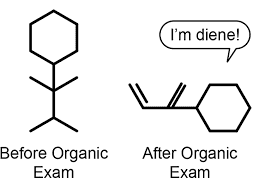How to Study for Organic Chemistry?
Your Guide to Choosing the Best JC Subject Combination for Yourself
February 5, 2020
The Power of Taking Effective Notes
August 14, 2020
Some Memorisation Is Necessary, But It’s Not Everything
- Only relying on memorising reactions is not enough, you will need to learn and truly understand the underlying concepts.
- Force feeding your brain with a large number of reactions and mechanisms is not an efficient method for sure. Instead, spend time analysing common patterns and understanding guiding principles.
- Once the CSI work is done, you will realise it’s much easier to remember and apply the knowledge.
FACTS and Methods to solve questions? Memorise Them!
Facts are information that help speed up the way you think and analyse questions.
Reagents and conditions: To deduce the type of reaction (of the functional group affected or the functional group in the unknown organic compound or the product formed).
Type of functional groups: To deduce the type of reaction. Read above.
Bond Strength: Knowing factors affecting bond strengths will help you rationalise which bond breaks and forms since all chemical reactions involve bond breaking and forming! (One of the major driving forces of reaction)
Electronegativity: The factor that is often used to determine the polarity of carbon (nucleophilic, electrophilic or none) and hence what it is attacked by – electrophiles, nucleophiles or radicals. It is also a major part in deciding the inductive nature of certain atoms or groups, thus closely related to the next point – the electronic effects.
Electronic effects: Inductive, Resonance, Aromaticity – One of the most used factors to explain the stability or reactivity of all ions or compounds, which is then linked to the rate of reaction; and to explain why the formation of certain species is preferred in a reaction.
Steric Effects: Use this when electronic factors or bond strength do not work!
Hybridisation: Use to explain bond strength, bond length, bond angles, angle strains and even acidity/ basicity of organic molecules.
Solidify Knowledge and Close the Gaps – Applying Skills and Concepts
- The drawing of mechanisms, synthesis of organic molecules and elucidation of unknown compounds – these are skills that require doing practice problems. Just like you can’t prepare for a musical performance just by simply reading the music score, you need to practice, practice and practice!
- Concepts are useful generalisations based on facts. We can use concepts learnt to help our understanding and apply them on a wide range of other concepts –but only if the “why” behind these concepts are fully investigated and understood.
- Practise makes perfect? Nope! Practise makes permanent! So, after you complete your practice problems, make sure you check meticulously against the marking scheme to uncover any major gaps in your understanding, or if you have left out some important points – Focus on closing the gaps! Repeat until all gaps are closed and your understanding is finally completely and at this point, this knowledge stays permanently with you!
Good News: There’s a Finite Number of Important Concepts!
Join Us for our chemistry tuition in Singapore! Where we discuss all these necessary facts and concepts to make your learning more effective. Study less and perform better? Yes, it’s possible!
Unfortunately, school tutorials and TYS would only build the foundation for your H2 Chemistry concepts. You will need resources of higher difficulty level if you want to mimic what comes out during your school lecture tests and exams.
Bad News: Memorising infinity ways of application is mission impossible
There is an infinite number of questions they could ask, and it’s impossible to prepare for exams through memorisation. The only way is to do a lot of advanced problems and gain experiences by practising and learning from the mistakes made.




1 Comment
[…] being discussed. Mind mapping is particularly suitable for chemistry tuition that focuses on organic chemistry, for […]